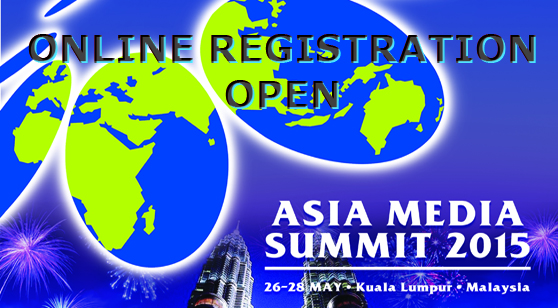Day 2 – Tuesday, 27th May 2015
1100 – 1230 : Plenary Session 4 : Making Sense of Big Data and Social Data
We encounter so much information that is diverse and growing faster day by day. This big data is migrating to all types of human endeavour, demanding that we see and understand the relations within and among pieces of information and what one can do with it. Big data has become a significant corporate asset and economic input to fuel the information economy. Social media is streaming big data that is appropriate for real time analysis and for communicating information about rapidly changing situations. Social data is mostly non-curated and its reliability varies substantially. What new insights can broadcasters glean from big data and social data? How can broadcasters sift and analyse them to improve content, viewer engagement and operational efficiencies? What analytic tools are useful and effective to drive the value obtained from big data and social data throughout the organisation?
Day 2 – Tuesday, 27th May 2015
1100 – 1230 : Plenary Session 4 : Making Sense of Big Data and Social Data
We encounter so much information that is diverse and growing faster day by day. This big data is migrating to all types of human endeavour, demanding that we see and understand the relations within and among pieces of information and what one can do with it. Big data has become a significant corporate asset and economic input to fuel the information economy. Social media is streaming big data that is appropriate for real time analysis and for communicating information about rapidly changing situations. Social data is mostly non-curated and its reliability varies substantially. What new insights can broadcasters glean from big data and social data? How can broadcasters sift and analyse them to improve content, viewer engagement and operational efficiencies? What analytic tools are useful and effective to drive the value obtained from big data and social data throughout the organisation?
Chairperson |
|
 |
YBhg. Dato’ Sri Dr. Sharifah Zarah Syed Ahmad Secretary-General, Ministry of Communications and Multimedia Malaysia (KKMM), Malaysia |
Speakers |
|
 |
Mr Bob Chua Founder and Chief Executive Officer, Pulse Group, Malaysia |
 |
Ms Maria A. Ressa Chief Executive Officer & Executive Editor, Rappler Inc., Philippines |
 |
Mr Hirofumi Abe Program Director, Special Task Force, News Department, Japan Broadcasting Corporation (NHK), Japan |
 |
Ms Sandra Hanchard Researcher, Big Data Malaysia, Malaysia |
 |
Mr Björn Stockleben Technical Manager, Radio and Television Berlin Brandenburg (RBB), Germany |
AMS 2015 : Plenary Session 4
Day 2 - Tuesday, 27th May 2015
1100 - 1230 : Plenary Session 4 : Making Sense of Big Data and Social Data
We encounter so much information that is diverse and growing faster day by day. This big data is migrating to all types of human endeavour, demanding that we see and understand the relations within and among pieces of information and what one can do with it. Big data has become a significant corporate asset and economic input to fuel the information economy. Social media is streaming big data that is appropriate for real time analysis and for communicating information about rapidly changing situations. Social data is mostly non-curated and its reliability varies substantially. What new insights can broadcasters glean from big data and social data? How can broadcasters sift and analyse them to improve content, viewer engagement and operational efficiencies? What analytic tools are useful and effective to drive the value obtained from big data and social data throughout the organisation?
AMS 2015 : Plenary Session 3
Day 2 - Tuesday, 27th May 2015
0900 - 1030 : Plenary Session 3 : Defining and Implementing Legal and Regulatory Guidelines
As social media grows explosively, lawmakers and regulators grapple with important legal and regulatory issues to keep pace with the speed and impact of change. Guidelines to maximise social media’s benefits and protect the public and other stakeholders from its risks are critical. Broadcasters face a similar challenge as they increasingly use social media to inform, educate and influence their audiences and other stakeholders. What regulatory guidelines should be in place to handle the right to privacy, data protection, freedom of information, copyright infringement, and employee rights, among others? Should broadcast organisations do more self-regulation that will need a solid social media policy or should they prepare for more government regulation and stricter enforcement?
AMS 2015 : Moderated Debate
Day 1 - Tuesday, 26th May 2015
1615 - 1730 : Moderated Debate : Journalism, Ethics and Social Media
With the advent of social media, a new breed of journalists is emerging. In blogs and micro blogs, social networking sites and in multimedia content sharing services, these ‘new’ journalists contribute, disseminate and share information. They have also performed news gathering and gatekeeping functions that mainstream media journalists have traditionally carried out. Are mainstream media’s rights, privileges and principles such as truth seeking and independent reporting threatened by the ‘new’ journalists? Are citizen journalists making news more or less accurate? Do we need to reinvent a code of media ethics from the ground up? How do we deal with new values such as transparency over objectivity? How should we treat unfiltered sharing of information over a filtered verification of the facts? What are the best forms of practice, and the norms to guide journalists?
AMS 2015 : Parallel Session 2
Day 1 - Tuesday, 26th May 2015
1400 - 1530 : Parallel Session 2: Facilitating Citizens’ Engagement during Elections
Social media offers opportunities for openness, participation, collaboration and interactivity that facilitate citizens’ engagement. Its many platforms can be useful during elections. Citizens can ask questions and solicit information on issues and events that affect their lives. They can participate in debate and discussion, and share their insights and feedback critical for the functioning of a healthy society. To what extent have social media platforms impacted elections and political agenda setting, particularly in countries with different media systems, different political systems and different population sizes? How can broadcasters interlink effectively with social media as a place of conversation for electoral issues and personalities? What are some best practices?
AMS 2015 : Parallel Session 1
Day 1 - Tuesday, 26th May 2015
1400 - 1530 : Parallel Session 1: New Technology/New Tools to Connect, Share and Network
Social media is constantly reinventing itself, offering users a wide range of technologies, tools and tactics for various purposes. We have software, apps, websites, text messaging, virtual worlds, game platforms, content sharing sites, podcasts, blog, tags, and mobile marketing. These are meant to reach out and connect with other human beings, create a relationship and build trust. Where is technology going that is reshaping the media market? What new tools and technologies are emerging that will ensure proficient application and improve relationships, content, viewership and revenues? How do we deal with Internet and broadband access and adoption to ensure the widest benefit of these social media tools and technologies?
AMS 2015 : Plenary Session 2
Day 1 - Tuesday, 26th May 2015
1115 - 1215 : Effective Strategies to Build Markets, Content and Business
More than developing a social media website, broadcasters need a social media strategy that will innovatively enhance their audience engagement, programmes, sales and promotion, research and their brand. Integrating the social media strategy into the overall business plan that reinforces each other becomes critical, and this can be done in a structured and effective manner. To catch audiences and boost ratings, should broadcasting organisations adopt social media anywhere, anytime and how? Do they have a clear vision and a set of strategies to deal with the benefits and risks of social media to business? How can broadcasters exploit social media to monetise opportunities, improve branding and ensure sustainability? How can broadcasters best measure the effectiveness and value for money of social media engagement?
AMS 2015 : Plenary Session 1
Day 1 - Tuesday, 26th May 2015
0945 - 1045 : Social Media’s Landscape, Trends and its Future
Social media is a vast and complex landscape to master, and players in this territory are afforded a wide range of functionalities to create content, publish, share, discuss and network. It enriches engagement with people, events and brands that matter to them. The broadcast industry needs to understand social media’s practical role and influence in business and society. What are the innovations and trends in social media’s usage, functionalities, and activities? Should broadcasters be concerned with its continued growth? Are they monitoring and exploiting social media and in what ways? Do they have policies to minimise social media’s misuse and other risks? What does the future hold beyond Facebook, Twitter and YouTube, among others?
AMS 2015 : Inaugural Session and Keynote Address
Day 1 - Tuesday, 26th May 2015
0900 : 0945 - Inaugural Session and Keynote Address
Welcome Remarks | Mrs Dra Rosarita Niken Widiastuti President of AIBD General Conference & President Director, Radio Republik Indonesia (RRI), Indonesia |
Keynote Address | YB Dato’ Sri Ahmad Shabery Cheek Minister of Communications and Multimedia Malaysia |
Special Address(Video Message) | H.E. Ban Ki-moon Secretary-General of the United Nations (UN) |
Closing Remarks | Mr Chang Jin Director, Asia-Pacific Institute for Broadcasting Development (AIBD) |
Extension of Online Registration Deadline for AMS 2015
Online Registration Extended
The deadline for online registration to the Asia Media Summit is now officially extended to Thursday, 30 April 2015.
All delegates are requested to urgently register by clicking the link here
Travel Itineraries
With the AMS fast approaching, all foreign delegates are urgently requested to submit their travel itineraries and hotel booking through their online registration or directly to AIBD.
Online Registration Opens for AMS 2015
Online Registration
Online registration for the Asia Media Summit (AMS) 2015, to be held from 26 - 28 May 2015 in Kuala Lumpur, Malaysia is now officially open. Please register using the link here.
We are encouraging all delegates to register as early as possible.
The deadline for registration is Wednesday, 15 April 2015.








